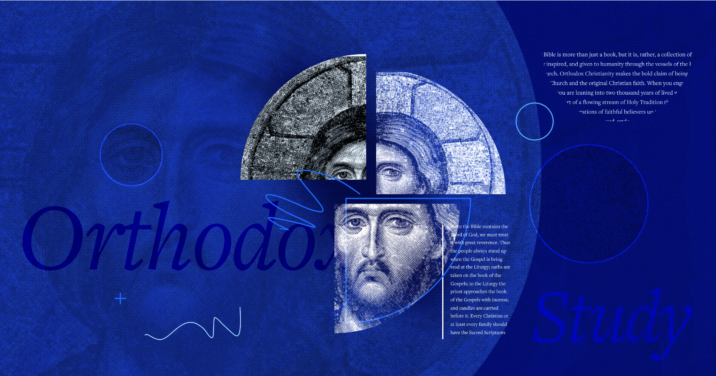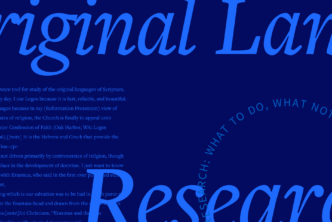Orthodox Christianity makes the bold claim of being the original Christian Church and the original Christian faith. How does this shape how Orthodox approach Bible study?
Orthodox Bible study sees itself as part of a flowing stream of Holy Tradition that runs directly from Christ through generations of faithful believers up to this present time. This living tradition shapes how we read, understand, and live the Scriptures today. When you engage in Orthodox Bible study, you are leaning into two thousand years of lived wisdom.
Table of contents
The Orthodox way
Orthodox Christianity traces its spiritual lineage directly to the apostles themselves. With the coming of Christ, God sent his Son to both Jews and Gentiles, establishing a new covenant that Orthodox Christianity believes it continues to embody.
While Western Christianity developed separately after the Great Schism of 1054—and later sub-divided into denominationalism after the Protestant Reformation of the sixteenth century—the Orthodox see themselves as a continuation of the early Church, rooted in the faith of Moses and the Prophets of the Old Testament. Thus, Orthodoxy believes it maintains the ancient practices and understandings of the early Church, that is, “what the Son and Word of God revealed to us, as interpreted by the holy Apostles and the God-bearing Fathers. ‘As the Apostles have taught, as the Teachers have set forth in dogmas, … thus do we believe, thus do we speak.’”1
This continuous chain of teaching ensures the preservation and proper understanding of divine truth. Orthodoxy isn’t merely about maintaining old ways—it’s about continuing a living Tradition that breathes with the Holy Spirit’s presence.
The nature of Scripture
For Orthodox Christians, the Bible is more than just a book; it is a collection of writings, divinely inspired, and given to humanity through the vessels of the Hebrews and the Church. So we approach Scripture reverently. As Father David Abramtsov notes:
Since the Bible contains the Word of God, we must treat it with great reverence. Thus the people always stand up when the Gospel is being read at the Liturgy; oaths are taken on the book of the Gospels; in the Liturgy the priest approaches the book of the Gospels with incense, and candles are carried before it. Every Christian or at least every family should have the Sacred Scriptures.2
The Bible is not a standalone book, floating free of context. Rather, it is centered in the revelation of God in Jesus Christ. The unified interconnectedness between Old and New Testaments hinges on the incarnation of Christ, demonstrating God’s plan for humanity. As Metropolitan Hierotheos Vlachos has said, because “Christ revealed all that was going to happen to the Prophets and the righteous of the Old Testament. Thus, many years beforehand, the Prophets described everything that was going to happen.”3
While we value historical understanding of the text, we recognize that Scripture’s meaning transcends its historical context. The same Spirit who inspired the biblical authors continues to illuminate their words for us today. Reading the Bible as an Orthodox Christian involves an interpretive method that isn’t just literal, but also typological, moral, and anagogical (i.e., it finds a spiritual or mystical meaning in the text).
Nonetheless, we also recognize various genres in Scripture, each requiring appropriate interpretative approaches. Historical narratives tell the story of God’s people, wisdom literature provides guidance for living, prophetic writings point to Christ, and the Gospels and Epistles reveal the fullness of God’s revelation in Christ.
Reading Scripture with the living Tradition
This prophetic revelation has been upheld and expounded within our Holy Tradition—the living presence of the Holy Spirit in the Church. It is not inappropriate to speak of Scripture itself as part of Holy Tradition. God inspired the books that comprise the Bible. Yet nowhere in the Bible is it written what belongs in the Bible—it is the testimony of Orthodox Tradition that gives us the twenty-seven books of the New Testament and a longer Old Testament canon than Protestants have.
What is Holy Tradition? In the words of St. Nicholas (Velimirović) of Žiča, it is “All those spiritual treasures which we inherited from our holy ancestors, which are in absolute accord with the Holy Scriptures, and which help us to understand Holy Scripture rightly.”4 The Bible serves as God’s inspired Word, written through human hands but guided by divinely-revealed wisdom. This guidance wasn’t random or haphazard, says Metropolitan Hierotheos: “When the apostles created a Church they maintained continual contact with it,” ensuring the proper transmission and understanding of Christ’s teachings.5
This universal understanding forms the foundation for how we approach Scripture. St. Vincent of Lerins, writing in the fifth century, articulates this principle: “all possible care must be taken, that we hold that faith which has been believed everywhere, always, by all.”6
The fundamental truth these teachings convey are transformative: “It is precisely because Christ deified human nature, and because He is at the right hand of the Father, that we also can be saved.”7 This understanding helps us approach difficult passages with both reverence and wisdom, seeing them as part of God’s plan for our salvation.
St. Ignatius of Antioch, writing to the Philadelphians in the early second century, emphasized the crucial importance of reading Scripture within the unity of the one Church: “All who belong to God and Jesus Christ are with the bishop; and all who repent [of schism] and come into the unity of the Church will also belong to God, that they may be living according to Jesus Christ.” He strongly cautioned those who would separate themselves from the Church’s understanding, warning that “If anyone follows a man who causes a schism he ‘does not inherit the kingdom of God,’” and that those who embrace strange doctrines separate themselves from the efficaciousness of Christ’s death.8 This ancient wisdom continues to guide Orthodox biblical interpretation today, reminding us that authentic Scripture study cannot be separated from the Church’s life and teaching.
The living Tradition: sources for Orthodox Bible study
The Orthodox Church recognizes multiple interconnected sources of divine knowledge that inform our understanding of Scripture. As Metropolitan Hilarion explains,9 these sources form a hierarchical yet integrated system, with Holy Scripture standing as the primary source of divine revelation. The liturgical tradition follows as a living expression of how the Church has understood and applied Scripture through the centuries, while the creeds, ecumenical councils, and church fathers provide authoritative interpretation and doctrinal framework. Early apocryphal writings, while not carrying the same weight as canonical Scripture, can also offer valuable historical context and insight into the early Church’s understanding.
What distinguishes Orthodox biblical interpretation, then, is its holistic integration of these sources within the Church’s living Tradition. Unlike approaches that might rely primarily on historical–critical methods or individual interpretation, Orthodox study views Scripture through the lens of the Church’s collective experience and wisdom. When studying any biblical passage, Orthodox Christians draw upon all these sources—consulting patristic commentaries, considering how the text is used in liturgical worship, reflecting on its representation in iconography, and understanding its place within the doctrinal framework established by the ecumenical councils. Each of these streams provide valuable context and interpretive insight when looking at Scripture.
Many wonder whether the Orthodox Church believes laypeople can interpret Scripture or if this is reserved for clergy. While we all can and should read Scripture, we should do so within the Church’s understanding, not in isolation. Regular participation in liturgical services, study of patristic commentaries, and guidance from experienced spiritual teachers help us to achieve this. When facing difficult passages, we turn to the Church’s Tradition, seeking wisdom from those who have wrestled with these texts before us. This comprehensive approach helps ensure that interpretation remains faithful to the Church’s teachings while allowing for deep personal engagement with the text.
Church fathers as interpreters of Scripture
There is no Orthodoxy without the holy fathers, those God-bearing saints who taught with authority the truth about Jesus Christ. Just as the prophets of old saw Christ’s coming centuries before it occurred, the fathers help us see Christ’s presence throughout Scripture and in our own lives. Some defended the faith against external critics, others clarified doctrine at crucial moments, while still others focused on spiritual practice and mystical understanding.
The church fathers aren’t distant historical figures in Orthodoxy—they’re our living teachers and guides. Their writings help us understand Scripture within the Church’s life and tradition, continuing the apostolic practice of maintaining contact with and providing guidance for the faithful. The fathers teach us to read Scripture not just with our minds but with our hearts. They show us how to find Christ prefigured in the Old Testament and revealed in the New. Their interpretations, tested by time and confirmed by the Church’s experience, continue to illuminate our understanding today.
Liturgy as a living expression of Scripture
In Orthodox worship, Scripture isn’t just read—it’s sung, chanted, depicted in icons, and woven into prayers. The hymns of the Church, especially those heard during Matins and the Divine Liturgy, have much to teach us about how the Church reads the Bible. The liturgical cycle brings biblical events into the present moment.
During Lent and Holy Week, for example, we don’t merely remember Christ’s Passion—we participate in it through the services, and we are given, through hymns, a typological interpretive framework of dozens of Old Testament texts, revealing their true meaning in Jesus Christ. The attentive worshiper will learn so much about studying Scripture just by attending Lenten services.
Saints, sacred art, and the symphony of faith
This foundational framework is further enriched by what Fr. Thomas Hopko identifies10 as additional sources of illumination: the lives and writings of the saints, canonical traditions, and sacred art.
The saints’ lives, for instance, demonstrate Scripture lived out in practice, while the Church’s canonical tradition helps apply biblical principles to everyday life. Icons also play a crucial role in Orthodoxy’s living interpretation of Scripture. Orthodox iconography isn’t merely decorative but serves as “theology in color,” offering visual instruction that complements written Scripture and helps one enter into the biblical narrative. When you stand before an icon of Christ’s baptism or resurrection, you’re invited to participate in these events spiritually, and studying the details of the icon reveals much about how to understand the scriptural texts in an Orthodox manner.
These various sources work in harmony, each illuminating the others to create what some might describe as a “symphony of faith.”11
The Orthodox approach to Bible study
The Orthodox approach to Scripture emphasizes the mystical encounter with God through worship, sacraments, and engagement with Scripture itself.
Its goal: transformation and theoria
Orthodox Bible study isn’t merely academic exercise—it’s transformation, so it aims at theoria: the vision of God.12 As Orthodox believers, we don’t just study our faith—we are called to live it in every aspect of our lives. As St. Bishop Nikolai Velimirovic reminds us, the Bible is called Holy Scripture “Because our holy God inspired and guided holy men in writing these holy books in order to teach us a holy life.”13
Saint Paul instructs us Romans 12:2: “Do not be conformed to this world but be transformed by the renewal of your mind” (ESV). This includes both action (praxis) and vision (theoria).14 Each reading of Scripture then should deepen our faith, guide our actions, strengthen our prayer life, and unite us more closely with Christ. We read not just to learn about God but to know him personally.
Its methods: preparation and application
This understanding fundamentally shapes the Orthodox approach to Bible study, making it clear that authentic biblical interpretation requires both spiritual preparation and practical application to life.
We must remember that knowledge of God isn’t merely intellectual. As Hieromonk Gregorios says, “although God is incomprehensible in His essence, He can be known through His energies.” Therefore, “in order for man to know the divine energies, he must make himself a pure vessel of divine grace.” Fr. Gregorios goes on to cite St. Paisios of the Holy Mountain as teaching that “with the mind man cannot grasp the divine energies if he does not first practice ascesis and live the divine energies, that the grace of God might be energized within him.”15
This occurs in two distinct stages: First, “[f]aith through hearing, when we listen to God’s word,” and second, “faith through vision (theoria), when we see God.”16 This isn’t just about gaining knowledge; it’s about experiencing God’s presence through engaging his Word in Scripture. As St. Symeon the New Theologian teaches us, “The abundant light of the All-holy Spirit is needed for the comprehension of God’s hidden mysteries.”17
The Bible comes alive in the hymns, readings, and prayer, but it seems most fully alive when we live its teachings. This means that regular participation in the Church’s sacramental life, personal prayer, fasting, and acts of charity create the context for truly understanding Scripture. As we grow in faith, the Word of God grows within us. Asceticism, obedience, faith, and love, therefore, are not optional for the faithful Orthodox Christian. As St. Peter puts it, “he has granted to us his precious and very great promises, so that through them you may become partakers of the divine nature” (2 Pet 1:4 ESV).
Practical guidance for Orthodox Bible study
Begin your Orthodox Bible study journey with prayer, asking the Holy Spirit for guidance. As we’ve learned, the path to understanding requires not just intellectual effort but spiritual preparation through ascetic practice and holy living. We must become pure vessels of divine grace to truly comprehend the Scriptures. This means combining our study with fasting, prayer, and active participation in the Church’s sacramental life.
Read slowly and contemplatively, allowing words to sink deep into your heart. Practice lectio divina, the ancient method of prayerful Bible study that includes reading, meditation, prayer, and contemplation.18 Connect what you read with your daily life and the challenges you face.
Resources for deeper study
The Orthodox Study Bible is an indispensable resource that provides helpful notes from an Orthodox perspective and provides a complete Orthodox Bible in English—many Bibles, whether Protestant or Catholic, are lacking some of the books we use.19 Helpful theological articles and even a reading plan in the back of the study Bible will help guide you.
The writings of the church fathers offer profound insights into Scripture and will help keep the modern reader rooted in the authentic Tradition. Key figures include St. John Chrysostom, St. Athanasius, St. Basil the Great, and St. Theophylact of Ohrid, whose exegesis and sermons have shaped Orthodox biblical interpretation.
Fortunately, we have many accessible resources for accessing the early fathers in English. Two of the best resources are available from Logos:
- Ancient Christian Commentary on Scripture
- The 37-volume set of the Early Church Fathers
Logos also offers several Orthodox libraries that can provide a diligent student of Scripture with plentiful resources for consulting the fathers.
Other great resources to consider include:
- The Bible and the Holy Fathers for Orthodox: Daily Scripture Readings and Commentary for Orthodox Christians, by Johanna Manley
- The Orthodox Bible Study Companion Series, by Fr. Lawrence Farley
Finally, the following books from Fr. Stephen de Young will provide insights into the world of Scripture:
- The Whole Counsel of God: An Introduction to Your Bible
- Religion of the Apostles: Orthodox Christianity in the First Century
- Apocrypha: An Introduction to Extra-Biblical Literature
Join parish Bible study groups where possible, learning from others’ insights and experiences, and being instructed in the faith by the spiritual fathers God has graciously given us.
Participate in liturgical services: “Come and see” (John 1:39 RSV). The Church’s hymns and prayers often contain deep biblical interpretations. Don’t overlook liturgical texts as study resources—pick up a prayer book and read the prayers; listen to the hymns at Matins.
Finally, if you don’t know where to start in Scripture, ask a priest you know or simply follow the Church’s lectionary, which is accessible through a variety of Orthodox calendar apps.20
Conclusion
As you seek to grow closer in your walk with our Lord through Orthodox Bible study, remember you’re not alone. You stand within a living Tradition stretching back to Christ himself. Let the rhythm of Church life guide your reading. Let the wisdom of the fathers illuminate your understanding. This connection to the early Church, through both the Old and New Testaments, anchors us in a faith that is ancient and ever new.
But most importantly, let Scripture become prayer in your heart. Through faithful study, regular worship, and an open heart, we don’t just read about God—we come to know him. That’s the true goal of Orthodox Bible study: not merely information, but transformation in Christ. As we read, study, and live the Scriptures within the Church’s Tradition, we participate in the ongoing story of God’s love for humanity, finding our place in his eternal plan of salvation.
Recommend resources from the article
Ancient Christian Commentary on Scripture Complete Set | ACCS (29 vols.)
Regular price: $499.99
Related articles
- What Is Orthodoxy? Understanding Orthodox Interpretation of Scripture
- The Definitive Guide to Christian Denominations
- To Creed or Not to Creed: Why You Need Creeds in the Christian Life
- How Did the Church Fathers Read? (Gerald Bray Interview)
- Hieromonk Gregorios, The Orthodox Faith, Worship, and Life: Orthodox Catechism: An Outline (New Rome Press, 2020), 13.
- Rev. David F. Abramtsov, The Orthodox Companion (Antiochian Orthodox Christian Archdiocese of North America, 1994), 212.
- Hierotheos Vlachos, Entering the Orthodox Church: The Catechism and Baptism of Adults (Birth of the Theotokos Monastery, 2004), 131–32.
- St. Bishop Nikolai Velimirovic, The Faith of the Saints: A Catechism (Seraphim Press, 2005), 17.
- Vlachos, Entering the Orthodox Church, 191.
- Vincent of Lérins, The Commonitory, in Sulpitius Severus, Vincent of Lérins, John Cassian, ed. Philip Schaff and Henry Wace, trans. C. A. Heurtley, vol. 11, A Select Library of the Nicene and Post-Nicene Fathers of the Christian Church, Second Series (New York: Christian Literature Company, 1894), 132.
- Vlachos, Entering the Orthodox Church, 164.
- Henry Bettenson, ed. and trans., The Early Christian Fathers: A Selection from the Writings of the Fathers from St. Clement of Rome to St. Athanasius (Oxford University Press, 1956), 64.
- See further discussion of Metropolitan Hilarion Alfeyev’s perspective here: Jamey Bennett, “What Is Orthodoxy? Understanding Orthodox Interpretation of Scripture,” Word by Word, Logos (blog), July 9, 2024.
- Thomas Hopko, The Orthodox Faith, 4 vols. (St Vladimir’s Seminary Press, 2016).
- Jamey Bennett, “Orthodox Theology in Symphonic Harmony,” Ancient Faith Ministries (blog), September 9, 2013.
- Theoria (θεωρία) is the Greek word that refers to contemplation, literally the object of what one beholds; in this case, God.
- Velimirovic, Faith of the Saints, 17.
- Hierotheos Vlachos, “Praxis and Theoria, or Action and Vision,” Orthodox Christianity Then and Now (blog), August 18, 2011.
- Gregorios, Orthodox Faith, Worship, and Life, 15.
- Vlachos, Entering the Orthodox Church, 164.
- Cited in Gregorios, Orthodox Faith, Worship, and Life, 14.
- See Fr. Thomas Hopko, “Meditation,” in The Orthodox Faith, vol. 4: Spirituality (St Vladimir’s Seminary Press, 2016).
- Additionally, Orthodox translators tend to favor the Greek Septuagint Old Testament over the Hebrew Masoretic text. The OSB provides an accessible English translation based on the Septuagint.
- For example, the Greek Archdiocese released this accessible and popular app: https://www.goarch.org/-/daily-reading-app.





